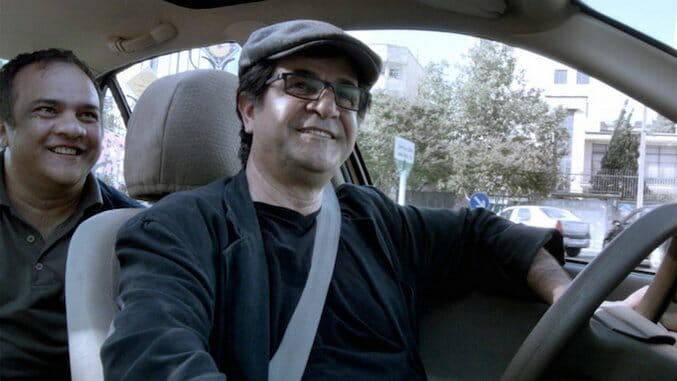
In the five years since Iranian director Jafar Panahi was sentenced by government authorities to a 20-year ban from filmmaking in his homeland, the acclaimed auteur has turned inward—and kept making movies. Complaining that Panahi’s subsequent films—the 2011 documentary This Is Not a Film, 2013’s dreamlike narrative Closed Curtain—have been a bit insular is to miss the deep emotional catharsis at the center of these works, Panahi externalizing his inner drama and creative frustration in blunt, personal terms.
Now comes Jafar Panahi’s Taxi, which carries itself like a nonfiction film but is actually scripted. Likewise, Taxi’s surface is casual, even impish, but underneath the movie are serious questions about filmmaking and individual freedom. If This Is Not a Film was defiant and Closed Curtain despairing, this new film is assured, composed, determined. And it stays with you, its larger implications asserting themselves in the hours after an initial viewing.
The film lays out its conceit in its opening moments. Panahi is driving around Tehran in a cab, having installed small cameras onto the dashboard, and he’s picking up random passengers. Taking place over the course of a day, Taxi consists of his interactions with these different people, some of whom recognize him. Episodic and off-the-cuff, the 82-minute film initially feels like a lark, a renowned filmmaker spending a little time with everyday folks. But around the time that a married couple gets into the cab, the husband bloody and badly needing medical attention, it becomes clear that Panahi’s setup is actually a ruse, the whole project a work of fiction. (Because of Iran’s cultural restrictions, Taxi contains no credits, the actors and other crewmembers not listed on the film.)
But the trickery is less about deceiving the audience than it is about creating an environment in which Panahi can most clearly articulate his grief and anger. In some ways, Taxi improves upon his two previous films by cobbling together their strongest tendencies—the direct, likable presence of the director himself in This Is Not a Film and the creative license and hall-of-mirrors quality that informed Closed Curtain. With Taxi, Panahi uses fiction to express reality, so why shouldn’t the movie itself be a bit of a jumble between the two?
Not that Taxi is didactic: Usually, it’s just a pleasant little romp, Panahi hanging out with, among others, his adorable niece, a DVD bootlegger, an aspiring filmmaker, a human-rights lawyer (Nasrin Sotoudeh, essentially playing herself) and a childhood friend. Like a spiritual cousin to Manakamana, the recent documentary that consisted of unbroken shots of passengers riding a cable car in Nepal, Taxi derives some of its pleasure from the unhurried contemplation of people at rest. Oddly, though, the fact that Taxi is fiction doesn’t lessen that pleasure: Panahi and his cast (reportedly consisting entirely of nonprofessionals) have such a natural rapport that the movie’s conversations about repression, vengeance and how to see Woody Allen movies in Iran exude an offhand spontaneity. Just as impressive, Panahi deftly juggles between tones, making room for both the sweet interactions with his niece and the life-or-death urgency of the married couple.
In most of Taxi’s episodes, Panahi is actively driving, the more passive participant in the conversations—even though, of course, he’s the man moving the narrative forward. Is he playing himself or a variation of himself? It’s a question that comes to mind more than a few times during Taxi: Throughout the movie, there’s a sneaky getting-away-with-it giddiness to the proceedings, Panahi’s shy smile and modest demeanor belying both the severity of his punishment and the risks involved with making the movie we’re watching. But the Panahi we see in Taxi, as opposed to the one in This Is Not a Film (or the fictional representations of him in Closed Curtain), appears more at peace with his predicament, which doesn’t mean he’s any less defiant or critical of the Iranian government. Rarely has the simple act of running a couple low-tech cameras and driving around seemed more rebellious or inspiring.
Taxi speaks overtly about the future of film—even the niece has some thoughts on the matter—but its central topic is life in Iran, which we see in bits and pieces, inferred from the conversations. Gradually but insistently, Panahi pieces together a cultural landscape in which individuals don’t feel secure. (That’s expressed in several ways, whether it’s the bleeding husband, or the niece trying to cross a busy road, or the frantic pair of women who have to make it across town to an appointment by noon, or the frenzied traffic around Panahi as he tries to switch lanes.) And then, Taxi arrives at a conclusion so unexpected it ends up only fully resonating upon reflection. The minutiae of the everyday is Taxi’s secret subject—ultimately, the movie argues, even during a seemingly normal day, the most jarring things can happen. It’s a poignant metaphor for a filmmaker living in his own unpredictable private prison.
Director: Jafar Panahi
Writer: Jafar Panahi
Starring: Jafar Panahi
Release Date: October 2, 2015
Tim Grierson is chief film critic for Paste and the vice president of the Los Angeles Film Critics Association. You can follow him on Twitter.